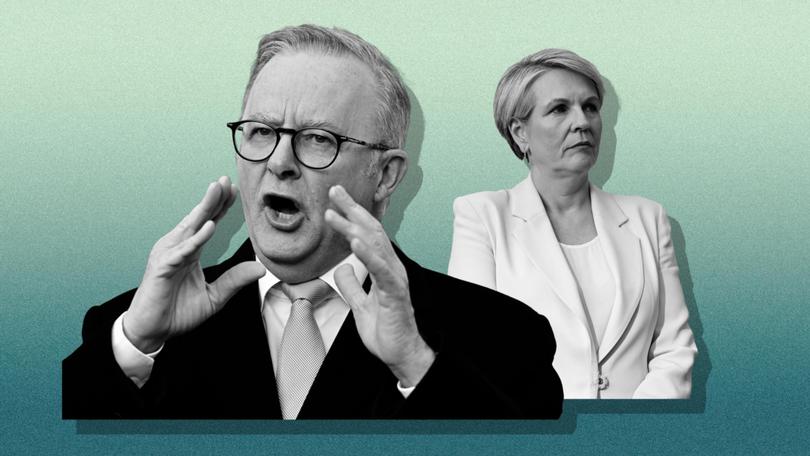Nature Positive: Tanya Plibersek insists Greens talks still on after Prime Minister shuts down deal
Anthony Albanese and Tanya Plibersek are at odds over Labor’s Nature Positive laws, with the Environment Minister insisting a deal with the Greens is still on the table despite the PM overruling her.

Anthony Albanese and Tanya Plibersek are at odds over Labor’s Nature Positive laws, with the Environment Minister signalling a deal with the Greens is still on the table despite the Prime Minister effectively ruling it out.
Just hours after Mr Albanese all but put a stop to speculation of a deal with the Greens, Ms Plibersek confirmed talks were still on as she remained determined to deliver Labor’s key election promise.
The Opposition has seized on the division to demand the Government “get their story straight”, while grassroots Labor members are warning it would be a “tragedy” if the laws were ultimately shelved.
Sign up to The Nightly's newsletters.
Get the first look at the digital newspaper, curated daily stories and breaking headlines delivered to your inbox.
By continuing you agree to our Terms and Privacy Policy.Mr Albanese on Monday morning seemingly shut the door on a potential deal with the Greens, pulling rank on Ms Plibersek after days of publicly flirting with the option of teaming up with the left-wing party to create a new Environment Protection Agency.
Ms Plibersek refused to rule out a deal even after the Government pulled the laws from debate following a major backlash from business, which is adamant any Labor-Greens deal would inevitably lead to a “climate trigger”.
Speaking at Parliament House, the Prime Minister put a line through the Greens’ key demand for climate change to be factored into the environmental approval process.
Mr Albanese confirmed he was opposed to adding a “climate trigger” to federal nature laws, insisting pollution from mining and industrial projects was already managed under the Commonwealth’s safeguard mechanism.
Ms Plibersek has made a similar point about the safeguard mechanism, while leaving open the option of a deal with the Greens.
“With regard to climate trigger and other things that they’re (Greens) raising, I’ve made it clear … that I don’t support adding a trigger to that legislation,” Mr Albanese said.
“Climate issues are dealt with through the safeguard mechanism.
“We’ve dealt with that. We have a target for 43 per cent and we have a vehicle for emissions of large emitters as well as part of that program.”
Asked to clarify his position on requiring “climate considerations” as part of the assessment of projects, Mr Albanese said: “I’ve indicated clearly that there are measures in place already”.
Shadow environment minister Jonno Duniam said Mr Albanese’s intervention showed the Prime Minister and environment minister weren’t on the same page.
“The Prime Minister and the Environment Minister need to get their story straight,” he said.
“On the one hand the Prime Minister wants a watered-down body in the form of a Federal EPA to administer the same old, broken environmental laws that they promised would be updated last year.
“On the other is the Environment Minister who would entertain an economy-wrecking climate trigger with their natural governing partner, the Greens.”
Just hours after the Prime Minister effectively ruled out a deal with the Greens, Ms Plibersek confirmed talks were still alive.
“From the beginning, I have said that delivering improvements to national environment laws would require a bit of common sense, cooperation, and compromise,” she said in a statement to The Nightly.
“The Government is talking to people across the Parliament.”
Greens environment spokeswoman Sarah Hanson-Young said the party remained open to negotiating, including on the specifics around “climate considerations”.
Senator Hanson-Young took aim at Mr Albanese, describing him as a “bulldozer” — just like his predecessor Scott Morrison — for refusing to negotiate on the legislation.
“You can’t bulldoze your way through the Senate,” she said.
“We need to put a stop to the bulldozers in our forests and the bulldozers that are pushing our wildlife to extinction into breaking point.”
The Greens and crossbench are also demanding a crackdown on native logging in exchange for supporting Labor’s laws.
The laws to create the EPA are listed in the Senate on Wednesday after being pulled late last week following a major backlash from big business sparked by Ms Plibersek’s flirtation with a Greens deal.
Business and mining groups, as well as the WA Government, are vehemently opposed to a “climate trigger”, adamant it would slow projects — including those critical to the green energy transition.
The Chamber of Minerals and Energy WA and the WA Chamber of Commerce and Industry were pleased Mr Albanese had ruled out adopting the policy.
“It is heartening to hear the Prime Minister unequivocally rule out inserting a climate trigger or climate considerations into the role of the proposed Federal Environment Protection Agency,” CME chief executive Rebecca Tomkinson said.
Mr Albanese wants to do a deal with Coalition and has offered to strip the proposed EPA of decision-making powers to secure its support.
The offer — which industry supports — so far hasn’t been enough to get Peter Dutton across the line as the Opposition continues to weigh up its position.
Labor’s grassroots environmental action group (LEAN) said the EPA – a 2022 election promise – was “core Labor business” that must pass.
“It will be a tragedy for the environment and the economy if these bills are pushed off,” LEAN national co-convenor Felicity Wade said.
“These reforms are about creating a rules-based order, removing the delay, confusion and lack of certainty in the current laws.”
